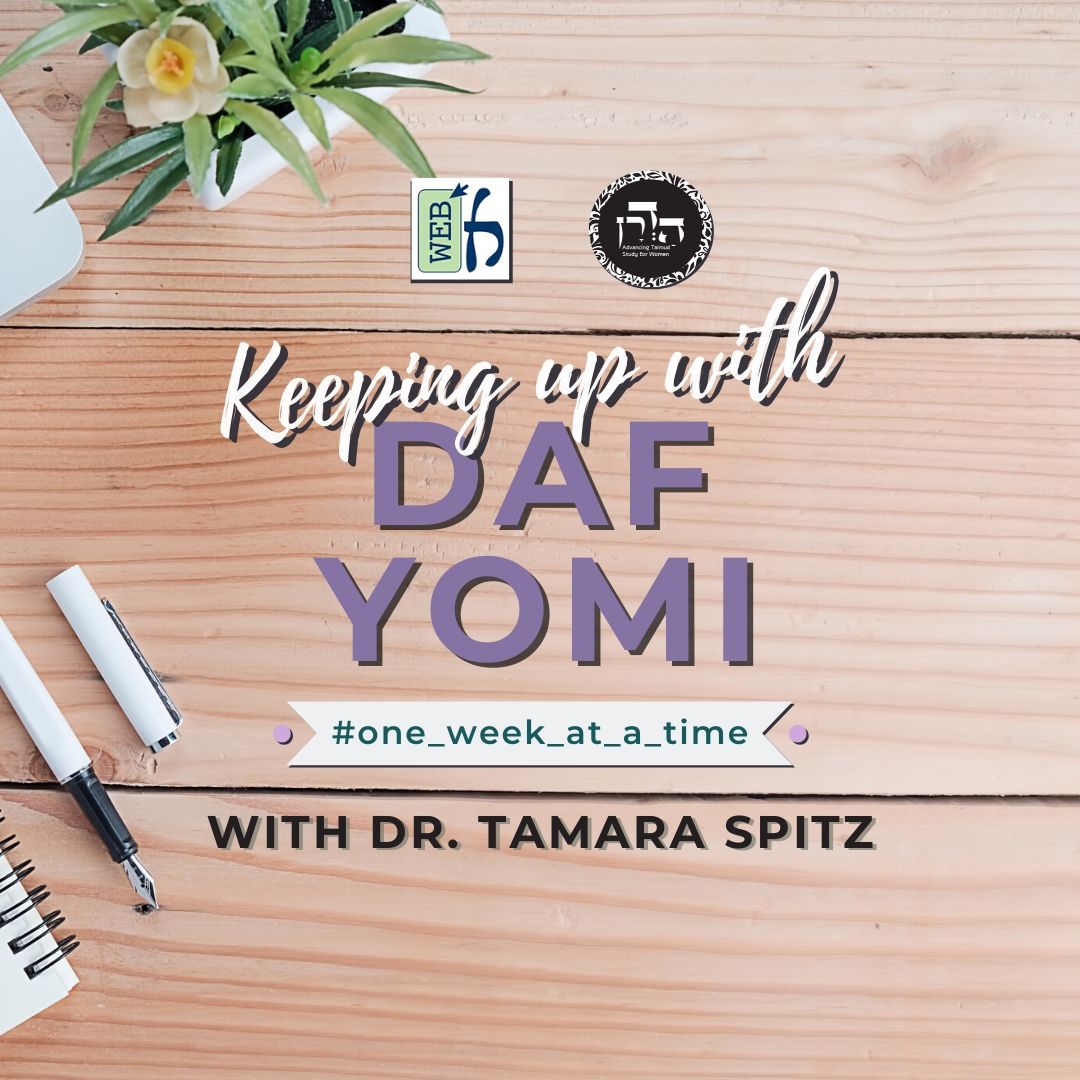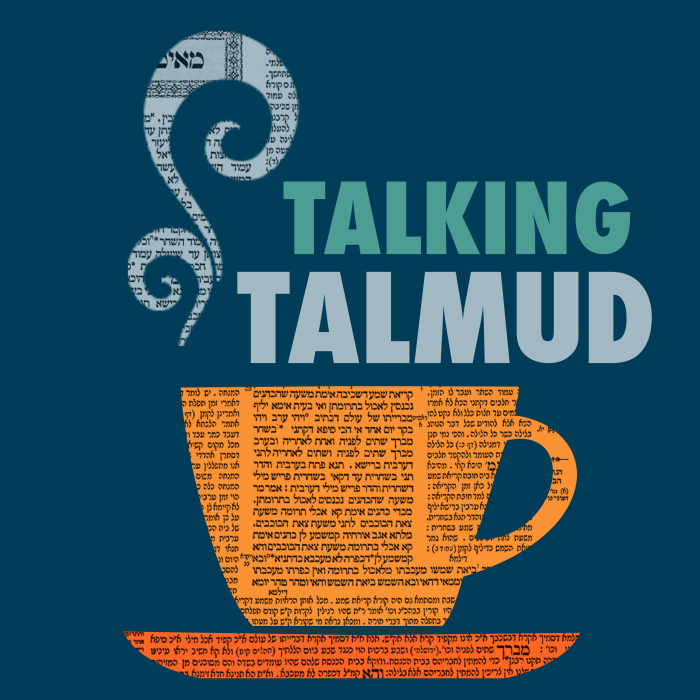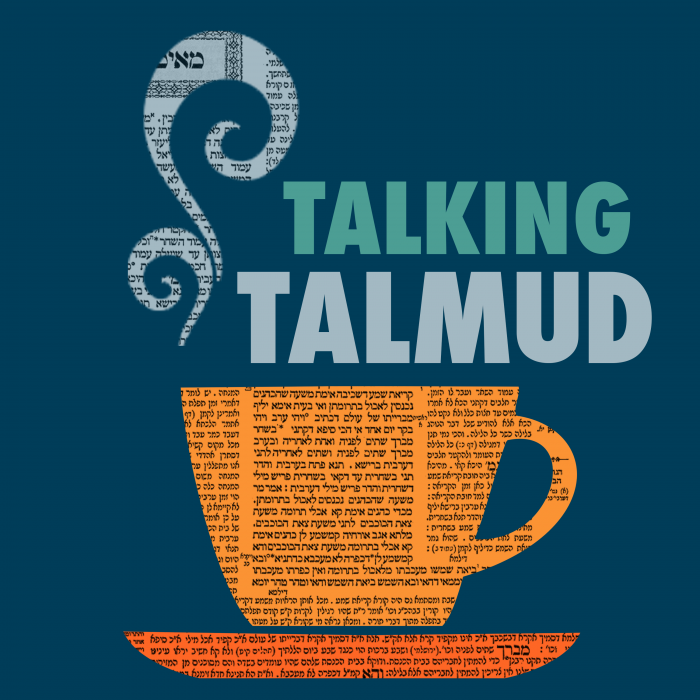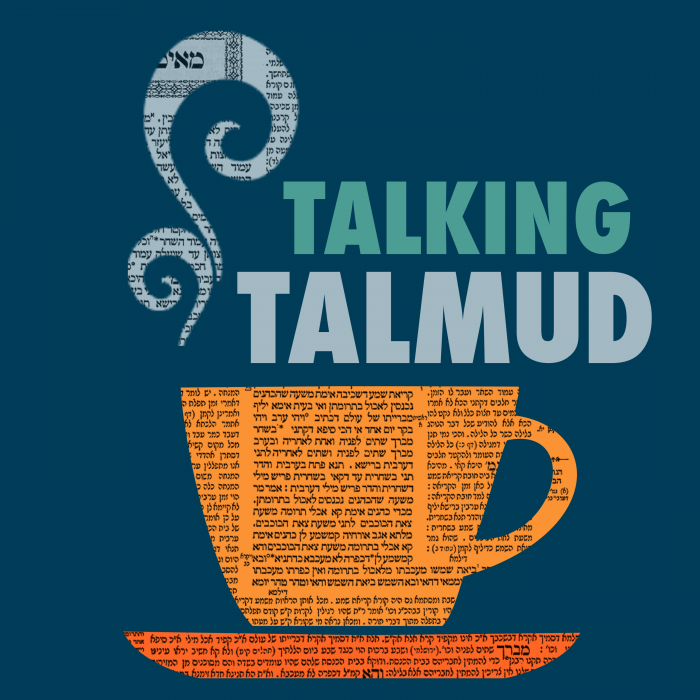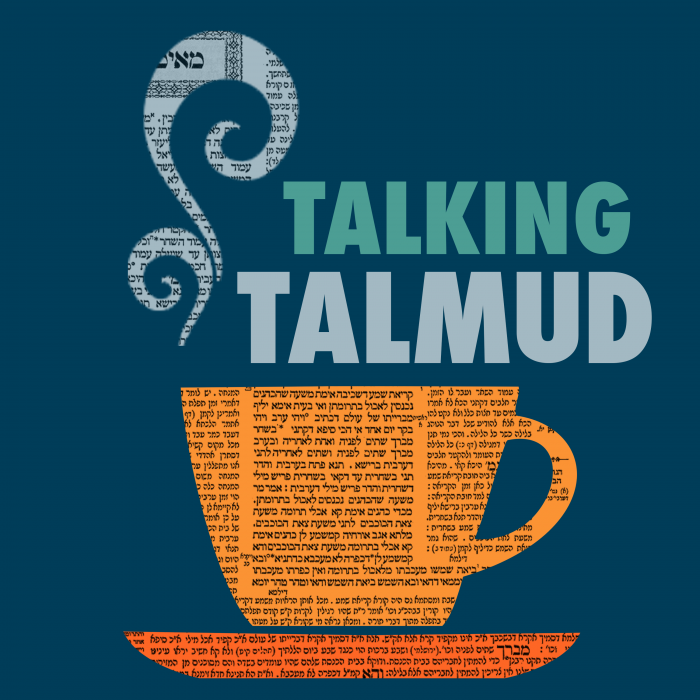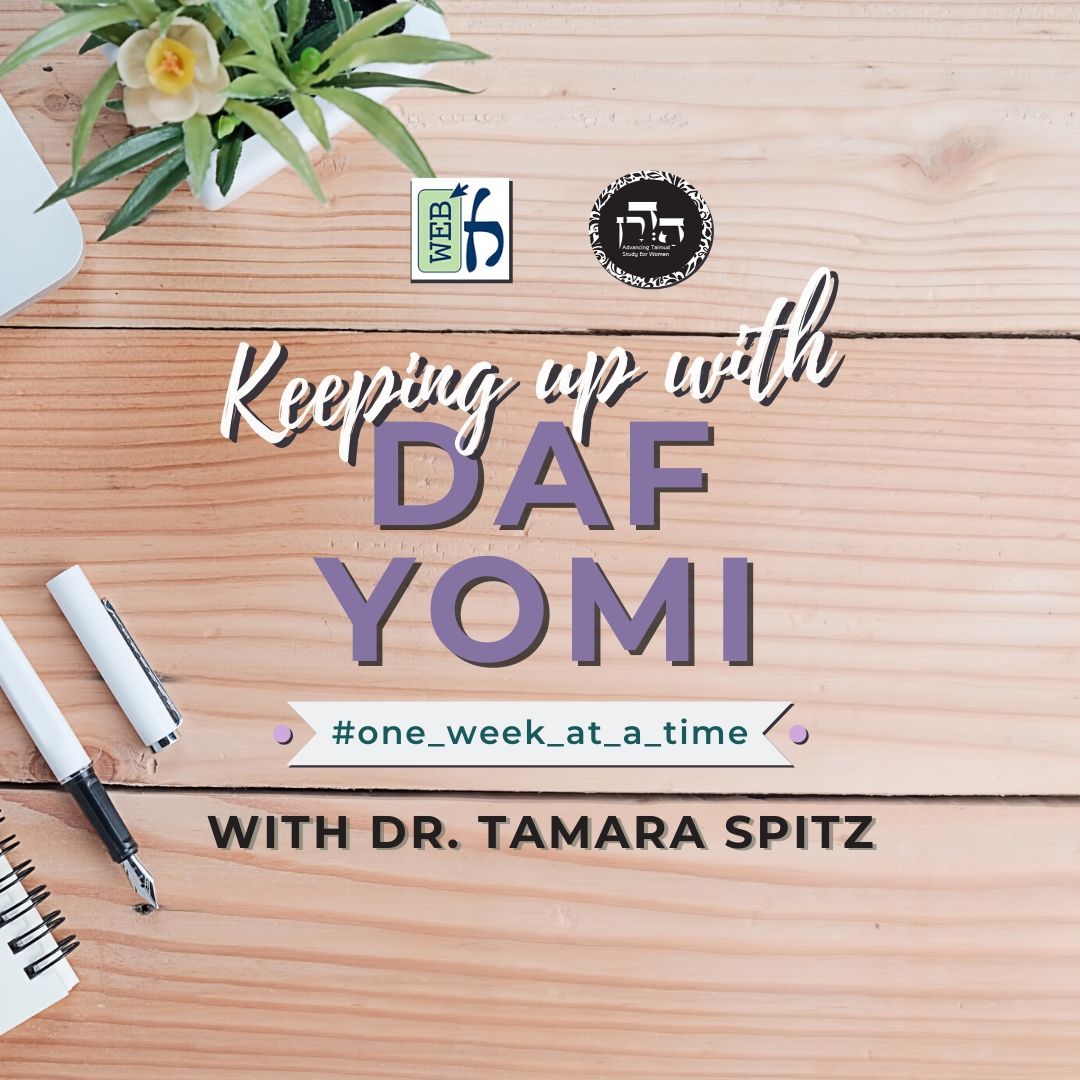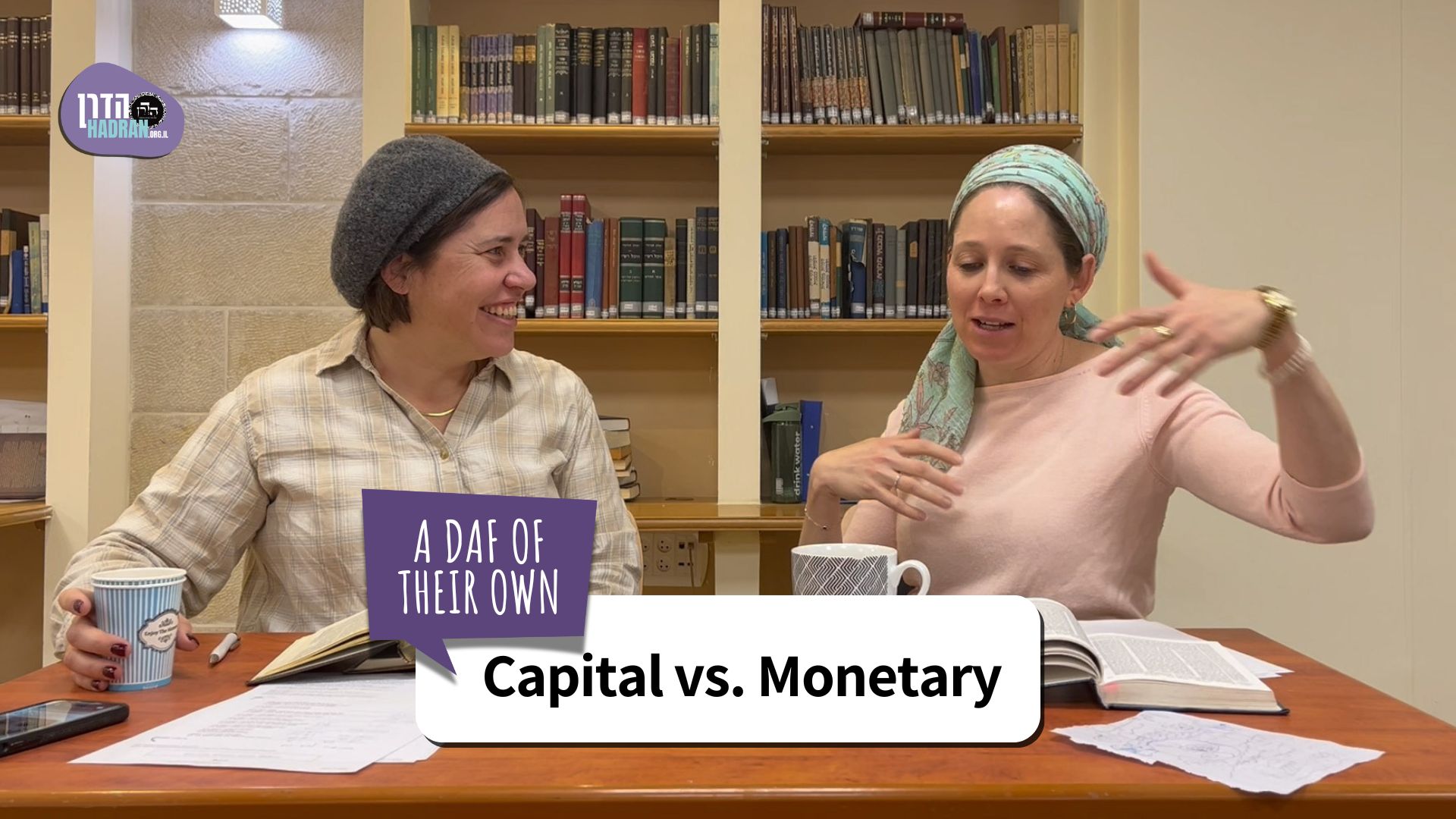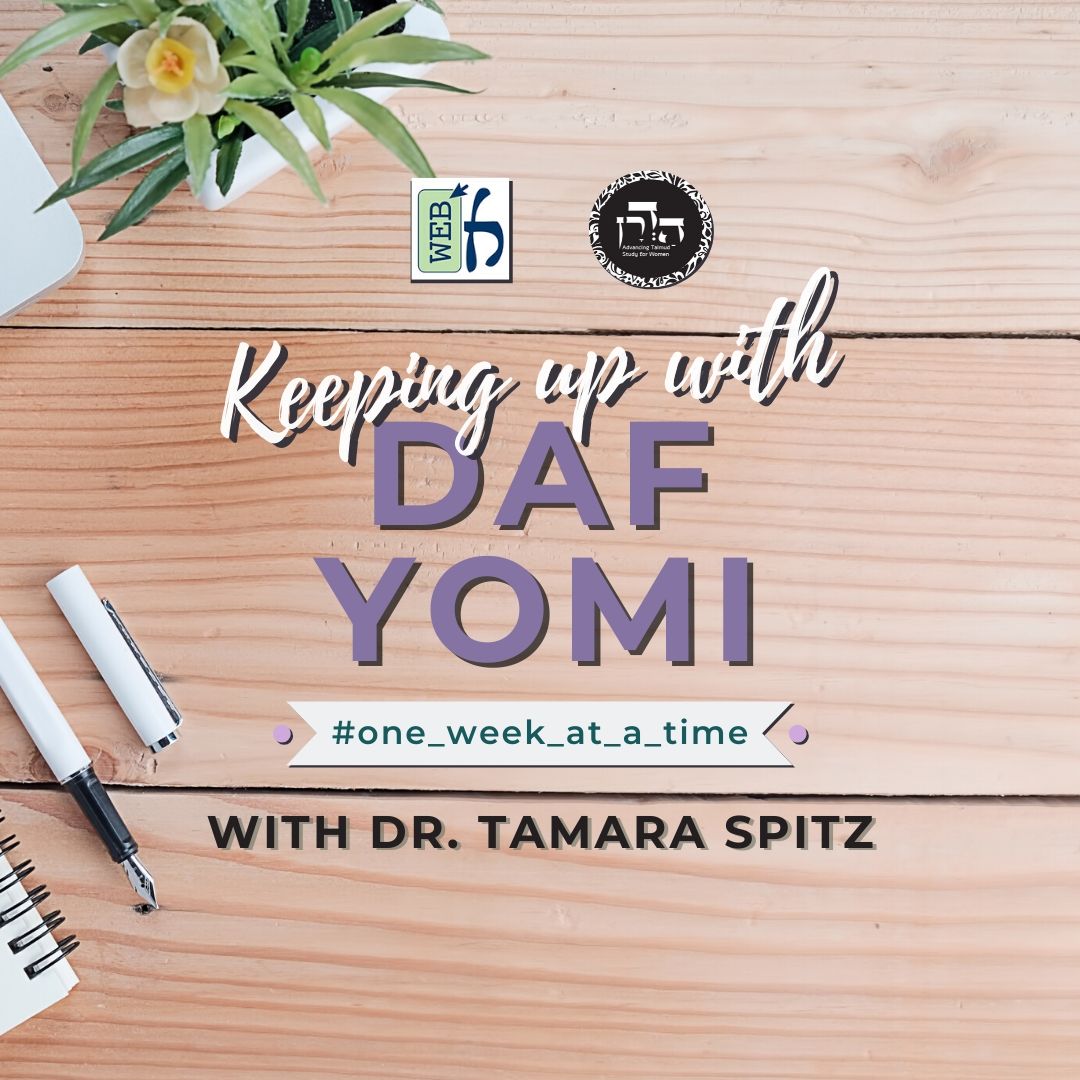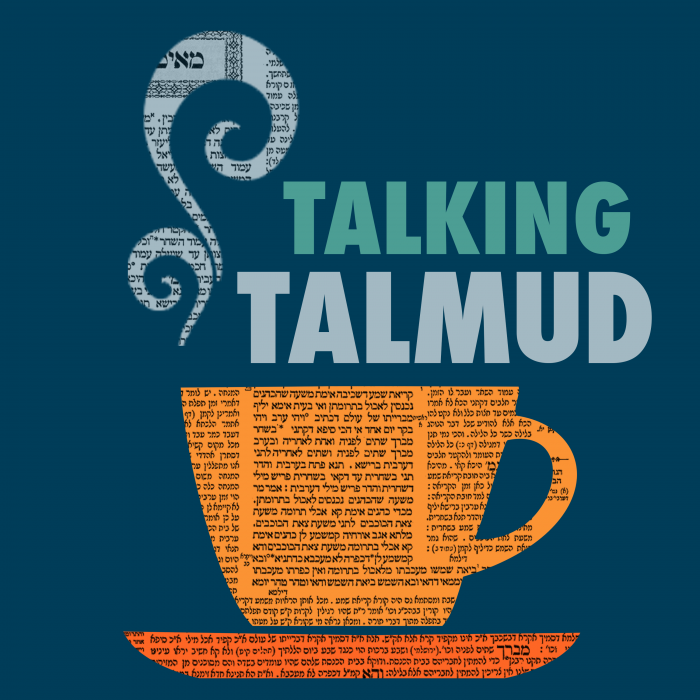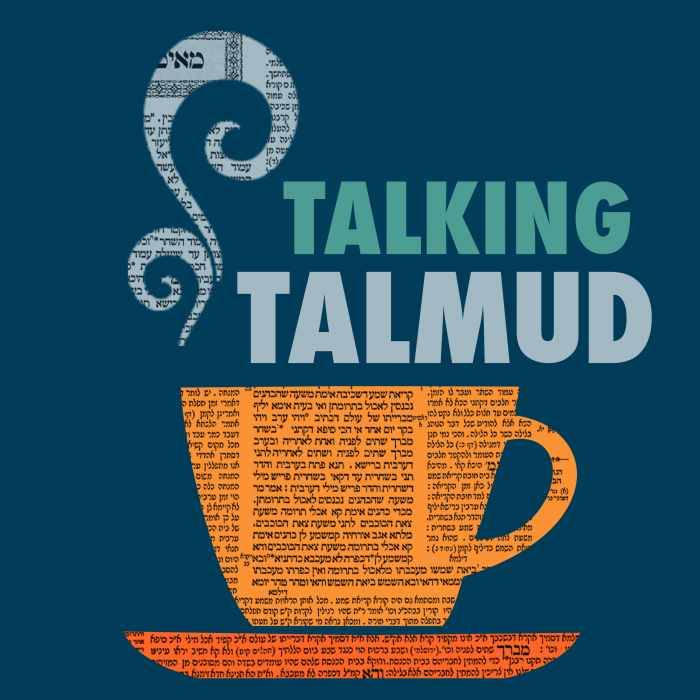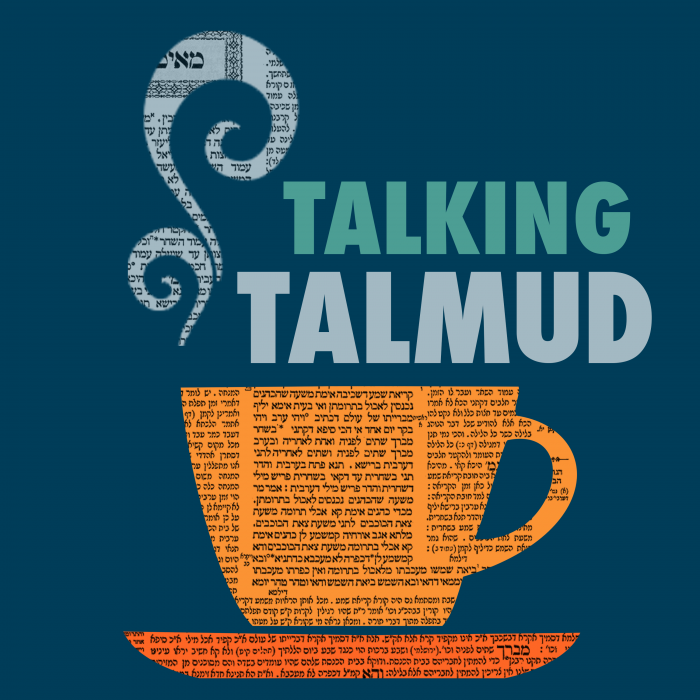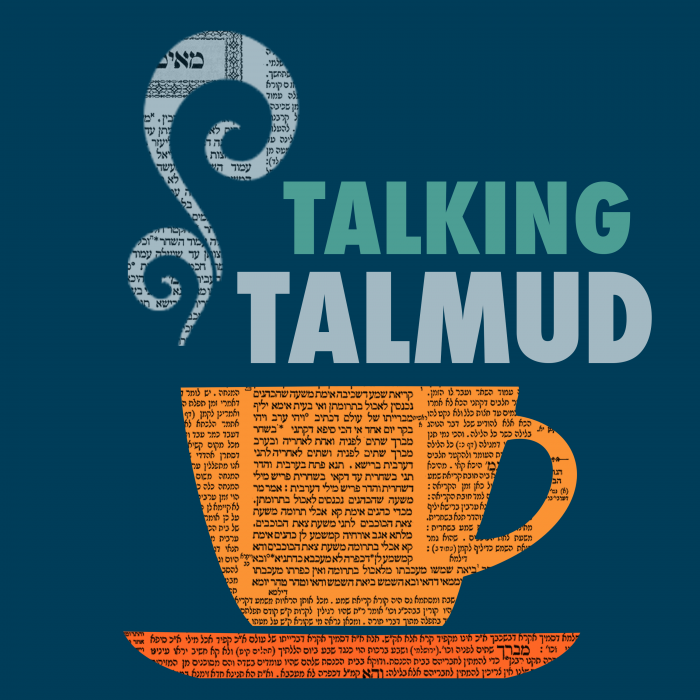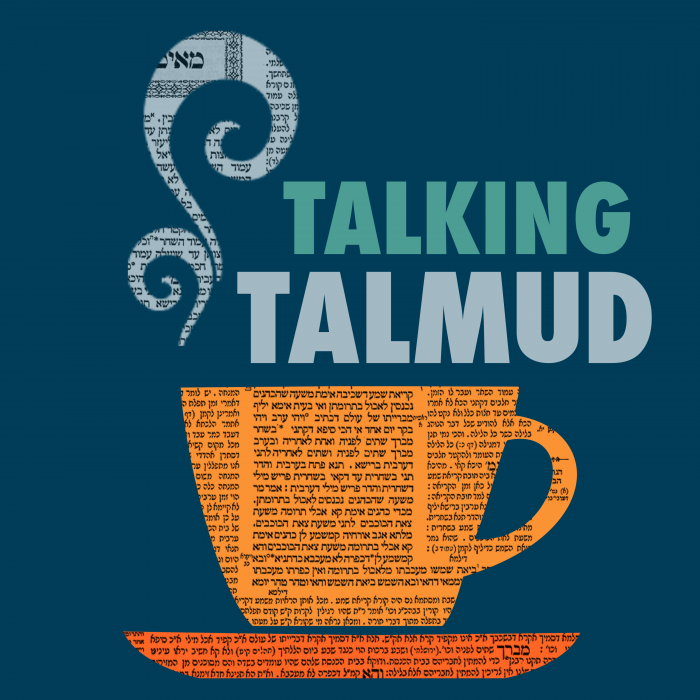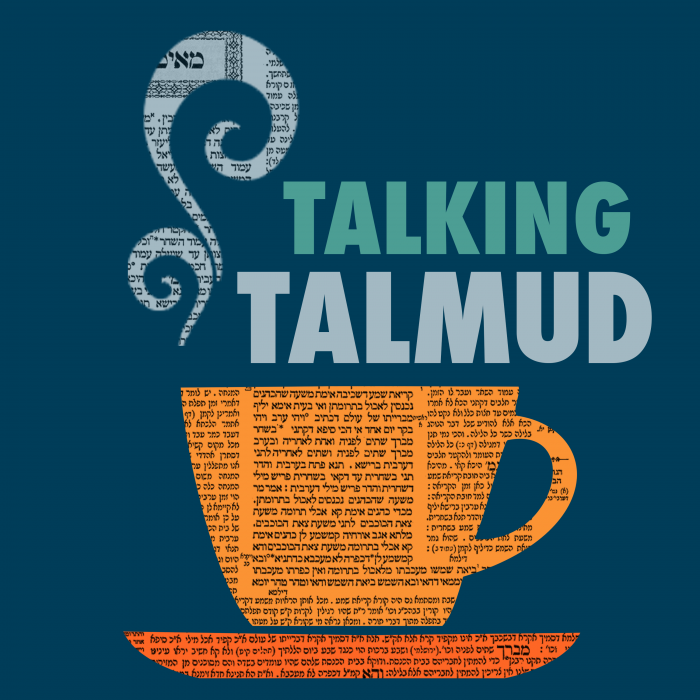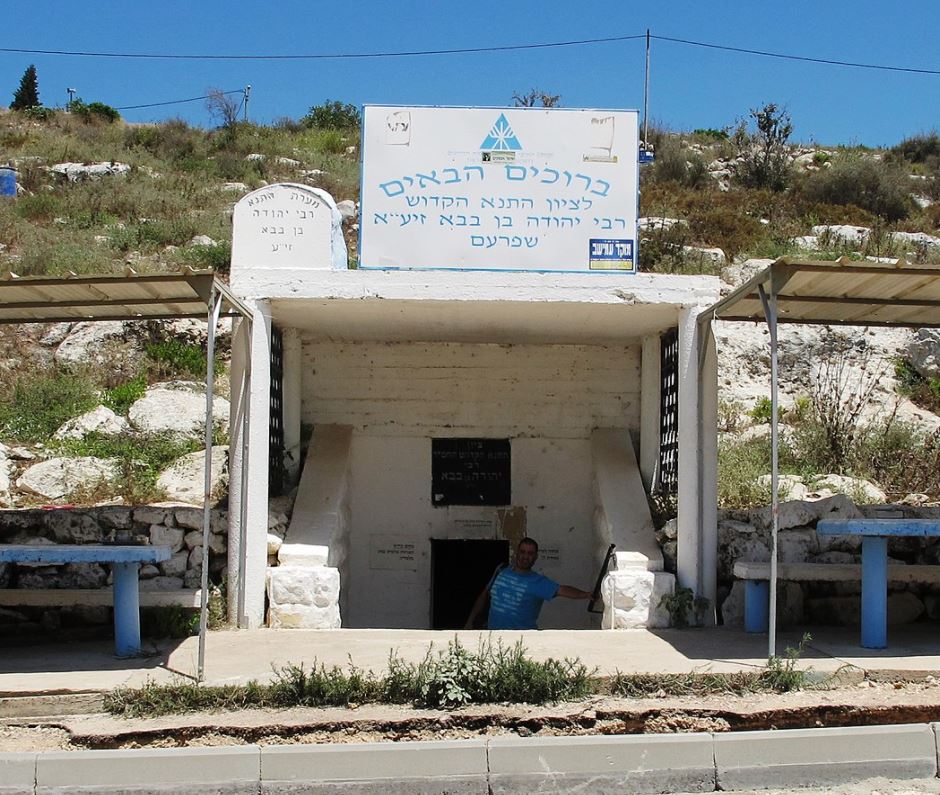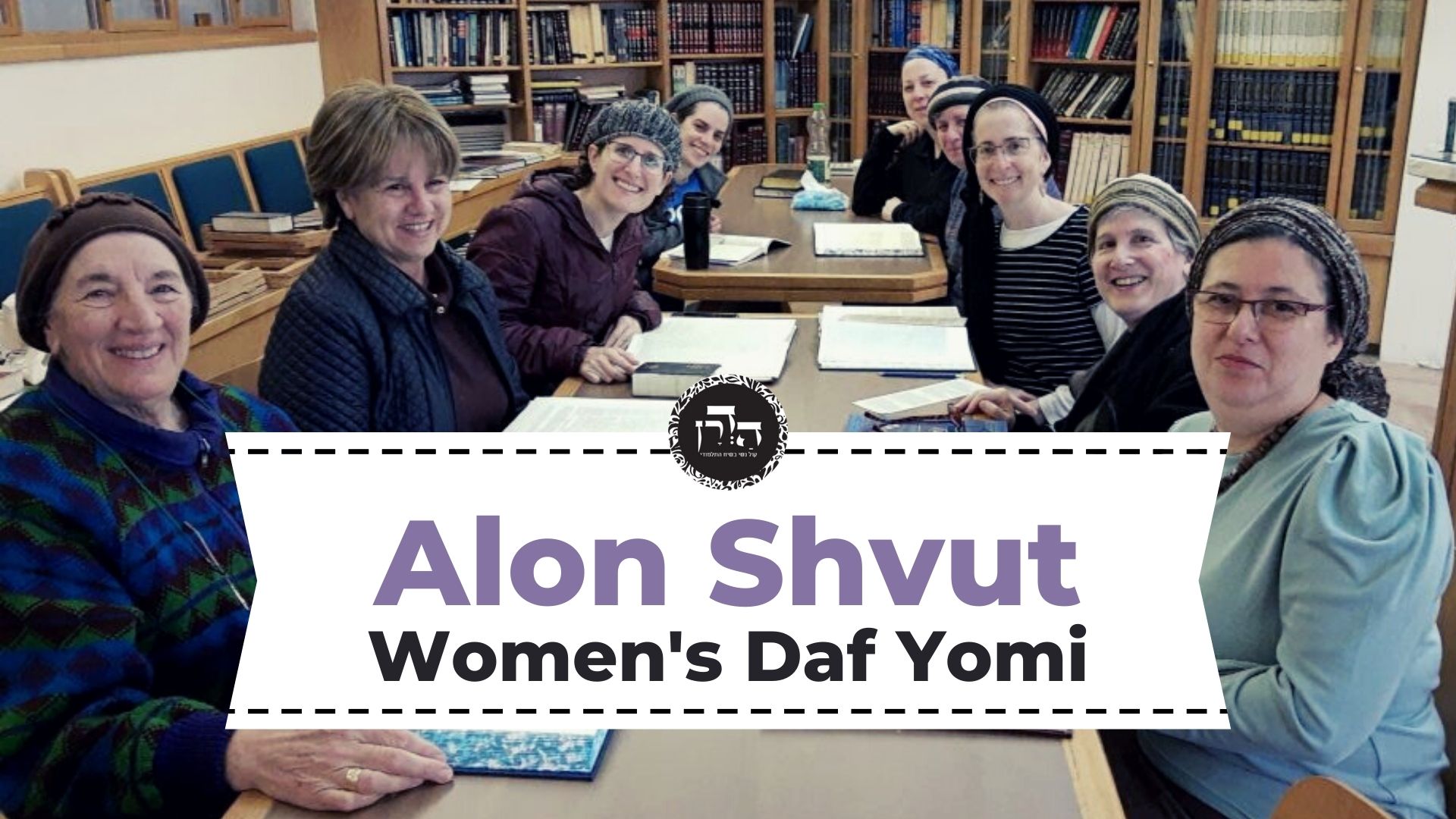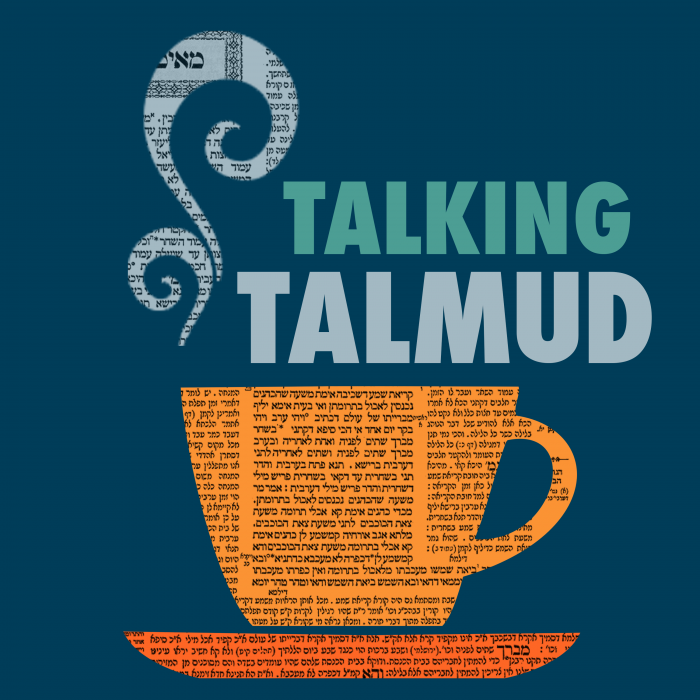After the gemara brings several more examples of sources that say everyone is obligated – priests, levites and israelites and explains the reason for it, it then brings a braita that expounds the verses about arakhin in various ways. The purpose was to explain the source why one with boils or despicable is included in arakhin. But in the process it brings several drashot and then explains how one can learn multiple laws from the same words (which generally is not allowed).
This week’s learning is sponsored for the merit and safety of Haymanut (Emuna) Kasau, who was 9 years old when she disappeared from her home in Tzfat two years ago, on the 16th of Adar, 5784 (February 25, 2024), and whose whereabouts remain unknown.
This week’s learning is dedicated of the safety of our nation, the soldiers and citizens of Israel, and for the liberation of the Iranian people. May we soon see the realization of “ליהודים היתה אורה ושמחה וששון ויקר”.
Want to dedicate learning? Get started here:


Today’s daily daf tools:
This week’s learning is sponsored for the merit and safety of Haymanut (Emuna) Kasau, who was 9 years old when she disappeared from her home in Tzfat two years ago, on the 16th of Adar, 5784 (February 25, 2024), and whose whereabouts remain unknown.
This week’s learning is dedicated of the safety of our nation, the soldiers and citizens of Israel, and for the liberation of the Iranian people. May we soon see the realization of “ליהודים היתה אורה ושמחה וששון ויקר”.
Today’s daily daf tools:
Delve Deeper
Broaden your understanding of the topics on this daf with classes and podcasts from top women Talmud scholars.
New to Talmud?
Check out our resources designed to help you navigate a page of Talmud – and study at the pace, level and style that fits you.
The Hadran Women’s Tapestry
Meet the diverse women learning Gemara at Hadran and hear their stories.
Arakhin 4
וְגוֹאֲלִין לְעוֹלָם, אֵימָא בְּמִצְוַת רֹאשׁ הַשָּׁנָה נָמֵי לָא לִיחַיְּיבוּ, קָמַשְׁמַע לַן: נְהִי דְּלֵיתַנְהוּ בְּהַשְׁמָטַת קַרְקַע בְּהַשְׁמָטַת כְּסָפִים — בְּשִׁילּוּחַ עֲבָדִים מִיהָא אִיתַנְהוּ.
and they may also redeem lands that they sold at any time, i.e., even right after selling the field, and are not bound by the halakhot of the Jubilee Year, one might say that they should also not be obligated to fulfill the mitzva of blowing the shofar on Rosh HaShana. Therefore, the baraita teaches us that this is not the case. This is due to the fact that although priests are not included in the release of land, in any event they are included in the release of money and in the release of slaves in the Jubilee Year. Therefore, the priests are obligated in the sounding of the shofar on Rosh HaShana.
הַכֹּל חַיָּיבִים בְּמִקְרָא מְגִילָּה, כֹּהֲנִים לְוִיִּם וְיִשְׂרְאֵלִים. פְּשִׁיטָא! לָא צְרִיכָא לִיבַטֵּיל עֲבוֹדָתָם, וְכִדְרַב יְהוּדָה אָמַר שְׁמוּאֵל, דְּאָמַר רַב יְהוּדָה אָמַר שְׁמוּאֵל: כֹּהֲנִים בַּעֲבוֹדָתָם, וּלְוִיִּם בְּדוּכָנָן, וְיִשְׂרָאֵל בְּמַעֲמָדָן — מְבַטְּלִין עֲבוֹדָתָם וּבָאִין לִשְׁמוֹעַ מִקְרָא מְגִילָּה.
§ The Gemara cites another similar baraita: Everyone is obligated in the reading of the Megilla including priests, Levites, and Israelites. The Gemara asks as before: Isn’t that obvious? The Gemara answers: No, it is necessary to teach that they cancel their service in the Temple and come to hear the reading of the Megilla, and this is in accordance with that which Rav Yehuda says that Shmuel says. As Rav Yehuda says that Shmuel says: The priests at their Temple service, and the Levites on their platform in the Temple where they sang the daily psalm, and the Israelites at their non-priestly watches for the offerings of the community, all cancel their service and come to hear the reading of the Megilla.
הַכֹּל חַיָּיבִין בְּזִימּוּן, כֹּהֲנִים לְוִיִּם וְיִשְׂרְאֵלִים. פְּשִׁיטָא! לָא צְרִיכָא, דְּקָאָכְלִי קׇדָשִׁים. סָלְקָא דַּעְתָּךְ אָמֵינָא: ״וְאָכְלוּ אוֹתָם אֲשֶׁר כֻּפַּר בָּהֶם״ אָמַר רַחֲמָנָא, וְהָא כַּפָּרָה הִיא.
The Gemara cites yet another similar baraita: Everyone is obligated to form a zimmun and recite Grace after Meals, including priests, Levites, and Israelites. The Gemara asks: Isn’t that obvious? The Gemara answers: No, it is necessary to teach this halakha in a case where the priests partake of sacrificial meat. It might enter your mind to say that since the Merciful One states in the Torah: “And they shall eat those things with which atonement was made” (Exodus 29:33), indicating that the owners of those offerings thereby achieve atonement, and therefore this consumption is an obligatory ritual act to bring about atonement, consequently, it is not considered a social meal requiring one to form a zimmun.
קָא מַשְׁמַע לַן, ״וְאָכַלְתָּ וְשָׂבָעְתָּ״ אָמַר רַחֲמָנָא, וְהָא אִיתַנְהוּ.
Therefore, the baraita teaches us that since the Merciful One states in the Torah: “And you shall eat, and be satisfied, and bless the Lord your God” (Deuteronomy 8:10), the obligation to recite Grace after Meals is contingent upon eating and being satisfied. Since there is eating and satisfaction in the case of priests partaking of the sacrificial meat, they are obligated to form a zimmun, despite the fact that the purpose of the meal is to bring about atonement.
הַכֹּל מִצְטָרְפִין לְזִימּוּן, כֹּהֲנִים לְוִיִּם וְיִשְׂרְאֵלִים. פְּשִׁיטָא! לָא צְרִיכָא, דְּקָאָכְלִי כֹּהֲנִים תְּרוּמָה אוֹ קׇדָשִׁים, וְזָר קָאָכֵיל חוּלִּין.
The Gemara cites another baraita: Everyone joins a zimmun: Priests, Levites, and Israelites. The Gemara asks again: Isn’t that obvious? The Gemara answers: No, it is necessary to teach this halakha in a case where the priests are partaking of teruma, the portion of produce designated for priests, or sacrificial meat, and a non-priest is eating non-sacred food.
סָלְקָא דַּעְתָּךְ אָמֵינָא: הוֹאִיל וְאִי בָּעֵי זָר לְמֵיכַל בַּהֲדֵי כֹּהֵן לָא מָצֵי אָכֵיל, אֵימָא לָא לִיצְטָרֵף, קָא מַשְׁמַע לַן: נְהִי דְּזָר בַּהֲדֵי כֹּהֵן לָא מָצֵי אָכֵיל, כֹּהֵן בַּהֲדֵי זָר מָצֵי אָכֵיל.
In such a case, it might enter your mind to say that since if the non-priest wants to eat together with the priest he cannot eat with him from the teruma, as it is forbidden to him, one could say that he cannot join with the priests for a zimmun. Therefore, the baraita teaches us that he can join them, as although a non-priest cannot eat together with a priest from his teruma, nevertheless, a priest can eat together with a non-priest from his food. Consequently, they can join together to form a zimmun.
הַכֹּל מַעֲרִיכִין, כֹּהֲנִים לְוִיִּם וְיִשְׂרְאֵלִים. פְּשִׁיטָא! אָמַר רָבָא: לֹא נִצְרְכָא אֶלָּא לְבֶן בּוּכְרִי, דִּתְנַן: אָמַר רַבִּי יְהוּדָה, הֵעִיד בֶּן בּוּכְרִי בְּיַבְנֶה: כׇּל כֹּהֵן שֶׁשּׁוֹקֵל אֵינוֹ חוֹטֵא.
§ The Gemara applies the same line of questioning to the mishna here: Everyone takes vows of valuation…priests, Levites, and Israelites. Isn’t that obvious? Rava said: This halakha is necessary only according to the opinion of ben Bukhri, who holds that priests are not obligated to contribute a yearly half-shekel to purchase the communal supplies. Therefore, one might have thought that they are not subject to the halakha of valuations, as the Gemara will explain. As we learned in a mishna (Shekalim 1:4) that Rabbi Yehuda said that ben Bukhri testified before the Sages in Yavne: Any priest who contributes the half-shekel for communal offerings is not considered a sinner, despite the fact that he is not obligated to contribute.
אָמַר לוֹ רַבָּן יוֹחָנָן בֶּן זַכַּאי: לֹא כֵּן, אֶלָּא כׇּל כֹּהֵן שֶׁאֵינוֹ שׁוֹקֵל חוֹטֵא, אֶלָּא שֶׁהַכֹּהֲנִים דּוֹרְשִׁין מִקְרָא זֶה לְעַצְמָן: ״וְכׇל מִנְחַת כֹּהֵן כָּלִיל תִּהְיֶה לֹא תֵאָכֵל״.
Rabbi Yehuda added that Rabban Yoḥanan ben Zakkai said to ben Bukhri: That is not the case; rather, any priest who does not contribute his half-shekel is considered a sinner, as they are obligated in this mitzva like all other Jews. But with regard to the priests who do not contribute the half-shekel, in order to excuse themselves from the mitzva they interpret this verse to their own advantage: “And every meal offering of the priest shall be wholly made to smoke; it shall not be eaten” (Leviticus 6:16).
הוֹאִיל וְעוֹמֶר וּשְׁתֵּי הַלֶּחֶם וְלֶחֶם הַפָּנִים שֶׁלָּנוּ הֵם, הֵיאַךְ הֵם נֶאֱכָלִין?
Those priests claim as follows: Since the omer offering, the measure of barley brought as a communal offering on the sixteenth of Nisan, and the two loaves, i.e., the public offering of two loaves from the new wheat, brought on the festival of Shavuot, and the shewbread placed on the Table in the Sanctuary each Shabbat, which are all meal offerings, are ours, i.e., if we would contribute half-shekels we would have partial ownership of these communal offerings, as they are purchased with the half-shekels, how then can they be eaten? They would be regarded as priests’ meal offerings, which must be wholly burnt, in accordance with the aforementioned verse.
וּלְבֶן בּוּכְרִי נָמֵי, כֵּיוָן דִּלְכַתְּחִילָּה לָא מִיחַיְּיבִי לְאֵיתוֹיֵי, כִּי מַיְיתֵי נָמֵי — חוֹטֵא הוּא, דְּקָא מְעַיֵּיל חוּלִּין לָעֲזָרָה! דְּמַיְיתֵי לְהוּ וּמָסַר לַצִּבּוּר.
The Gemara clarifies: But according to the opinion of ben Bukhri, as well, why is a priest who contributes a half-shekel not considered a sinner? Since he is not obligated to bring the half-shekel ab initio, when he brings the half-shekel he is also a sinner, since he is causing the bringing of a non-sacred item into the Temple courtyard. The Gemara answers that the priest brings and transfers the half-shekel as a consecrated gift to the community, so it is considered part of the communal funds.
סָלְקָא דַּעְתָּךְ אָמֵינָא: הוֹאִיל וּכְתִיב ״וְכׇל עֶרְכְּךָ יִהְיֶה בְּשֶׁקֶל הַקֹּדֶשׁ״, כׇּל דְּאִיתֵיהּ בִּשְׁקָלִים — אִיתֵיהּ בַּעֲרָכִין, וְהָנֵי כֹּהֲנִים, הוֹאִיל וְלֵיתַנְהוּ בִּשְׁקָלִים — לֵיתַנְהוּ בַּעֲרָכִין, קָא מַשְׁמַע לַן.
The Gemara explains the relevance of ben Bukhri’s opinion to the question of the priests’ status with respect to valuations. According to ben Bukhri, who exempts the priests from contributing the half-shekel, it might enter your mind to say that since it is written: “And all your valuations shall be according to the shekel of the Sanctuary” (Leviticus 27:25), perhaps this juxtaposition teaches that anyone who is included in the obligation to contribute half-shekels is included in the halakha of valuations. But with regard to these priests, since they are not included in the obligation to contribute half-shekels, they are also not included in the halakha of valuations. Therefore, the mishna teaches us that even according to the opinion of ben Bukhri, priests are included in the halakha of valuations.
אֲמַר לֵיהּ אַבָּיֵי: הַאי ״וְכׇל עֶרְכְּךָ״, לְכׇל עֲרָכִין שֶׁאַתָּה מַעֲרִיךְ לֹא יְהוּ פְּחוּתִין מִסֶּלַע הוּא דַּאֲתָא!
Abaye said to Rava: One could not have thought that this phrase: “And all your valuations shall be according to the shekel of the Sanctuary” (Leviticus 27:25), might be coming to exempt the priests, as it comes to teach something else, namely that all valuations that you assess should not be less than the value of a sela coin. In other words, a poor person, who gives according to his means rather than the amount prescribed in the Torah, does not fulfill his obligation unless he gives at least a shekel, which is a sela coin.
אֶלָּא אָמַר אַבָּיֵי: אִיצְטְרִיךְ, סָלְקָא דַּעְתָּךְ אָמֵינָא: הוֹאִיל וּכְתִיב ״וּפְדוּיָו מִבֶּן חֹדֶשׁ תִּפְדֶּה בְּעֶרְכְּךָ״, כׇּל דְּאִיתֵיהּ בְּפִדְיוֹן הַבֵּן — אִיתֵיהּ בַּעֲרָכִין, וְהָנֵי כֹּהֲנִים הוֹאִיל וְלֵיתַנְהוּ בְּפִדְיוֹן הַבֵּן — לֵיתַנְהוּ בַּעֲרָכִין, קָא מַשְׁמַע לַן.
Rather, Abaye said: It was necessary for the mishna to teach that priests are included in the halakha of valuation, as it might enter your mind to say: Since it is written with regard to a firstborn: “And their redemption money, from a month old you shall redeem them, shall be, according to your valuation, five shekels of silver” (Numbers 18:16), one might have said that anyone included in the mitzva of redemption of the firstborn son is included in the halakha of valuations; but with regard to these priests, since they are not included in the mitzva of redemption of the firstborn son, they are also not included in the halakha of valuations. Therefore, the mishna teaches us that priests are also included in the halakha of valuations.
אֲמַר לֵיהּ רָבָא: אֶלָּא מֵעַתָּה, גַּבֵּי אֵיל אָשָׁם, דִּכְתִיב: ״וְאֶת אֲשָׁמוֹ יָבִיא לַה׳ אַיִל תָּמִים מִן הַצֹּאן בְּעֶרְכְּךָ״, הָכִי נָמֵי דְּכׇל דְּאִיתֵיהּ בַּעֲרָכִין אִיתֵיהּ בְּאֵיל הָאָשָׁם, טוּמְטוּם וְאַנְדְּרוֹגִינוֹס דְּלֵיתַנְהוּ בַּעֲרָכִין לֵיתַנְהוּ בְּאֵיל הָאָשָׁם?
Rava said to Abaye: If that is so, that one can expound the term “according to your valuation” in this manner, one could expound similarly with regard to the ram of the guilt offering brought by one who robs and then takes a false oath. As it is written with regard to that offering: “And he shall bring his guilt offering to the Lord, a ram without blemish out of the flock, according to your valuation” (Leviticus 5:25). One can argue that so too, anyone who is included in the halakha of valuations is included in the ram of the guilt offering. Therefore, a tumtum or a hermaphrodite, who are not included in the halakha of valuations, as stated in the mishna, should also not be included in the ram of the guilt offering. But that is not so, as there is no opinion that exempts them from this offering.
אֶלָּא אָמַר רָבָא, וְאִיתֵּימָא רַב אָשֵׁי: אִיצְטְרִיךְ, סָלְקָא דַּעְתָּךְ אָמֵינָא, הוֹאִיל וּכְתִיב ״וְהֶעֱמִידוֹ לִפְנֵי הַכֹּהֵן״, וְלֹא כֹּהֵן לִפְנֵי כֹּהֵן, קָא מַשְׁמַע לַן.
Rather, Rava said, and some say it was Rav Ashi: It was necessary to teach that priests are included in the halakha of valuation because it might enter your mind to say: Since it is written concerning valuations: “But if he is too poor for your valuation, then he shall be set before the priest” (Leviticus 27:8), this indicates that a poor man is placed before the priest for valuation, but a priest is not placed before another priest for valuation. Therefore, the mishna teaches us that priests are also included in the halakha of valuations.
״נֶעֱרָכִין״ — לְאֵתוֹיֵי מְנוָּּול וּמוּכֵּה שְׁחִין. מְנָא הָנֵי מִילֵּי?
§ The Gemara stated (2a) that the mishna’s statement: And everyone is valuated, serves to add that a repulsive man and one afflicted with boils are valuated in accordance with the Torah’s categories of age and sex despite their lack of market value. The Gemara asks: From where is this matter derived?
דְּתָנוּ רַבָּנַן: ״בְּעֶרְכְּךָ״ — לְהָבִיא עֵרֶךְ סָתוּם. דָּבָר אַחֵר: ״בְּעֶרְכְּךָ״ — עֵרֶךְ כּוּלּוֹ הוּא נוֹתֵן, וְלֹא עֵרֶךְ אֵבָרִים.
The Gemara answers that it is as the Sages taught in a baraita: The verse states: “When a man shall clearly utter a vow of persons to the Lord, according to your valuation” (Leviticus 27:2). The term serves to include an unspecified valuation, as explained below. Alternatively, the verse teaches that one gives the valuation of his entire self and not the valuation of his limbs. If someone vows that he will give the valuation of a limb, he is not obligated to give anything.
יָכוֹל שֶׁאֲנִי מוֹצִיא אַף דָּבָר שֶׁהַנְּשָׁמָה תְּלוּיָה בּוֹ? תַּלְמוּד לוֹמַר ״נְפָשׁוֹת״, נְפָשׁוֹת — וְלֹא הַמֵּת.
The baraita continues: One might have thought that I should exclude even the valuation of an item upon which the soul is dependent, without which one would die, e.g., the liver. Therefore, the verse states: “Persons [nefashot],” which teaches that if one valuated a limb upon which the soul [nefesh] is dependent, he is obligated to give the valuation of his entire self. The Gemara further derives from the term “persons” that one is obligated to pay the valuation only of a live person, and not the valuation of the dead. If one valuates a deceased person, his statement is of no effect.
אוֹצִיא אֶת הַמֵּת, וְלֹא אוֹצִיא אֶת הַגּוֹסֵס? תַּלְמוּד לוֹמַר: ״וְהֶעֱמִיד… וְהֶעֱרִיךְ״ — כֹּל שֶׁיֶּשְׁנוֹ בְּהַעֲמָדָה, יֶשְׁנוֹ בְּהַעֲרָכָה, וְכֹל שֶׁאֵינוֹ בְּהַעֲמָדָה, אֵינוֹ בְּהַעֲרָכָה.
Furthermore, one might have thought that I should exclude only the dead from valuation, but I should not exclude a moribund person, who is about to die but is still alive, and who is therefore included in the category of “persons.” Therefore, the verse states: “Then he shall be set before the priest, and the priest shall value him” (Leviticus 27:8). This teaches that anyone who is included in the category of setting, i.e., he can stand, is included in the halakha of valuation. And anyone not included in the category of setting, who cannot stand, e.g., one who is on his deathbed, is not included in the halakha of valuation. Therefore, one who valuates a moribund individual is not obligated to pay anything.
דָּבָר אַחֵר: ״נְפָשֹׁת״, אֵין לִי אֶלָּא אֶחָד שֶׁהֶעֱרִיךְ אֶחָד, אֶחָד שֶׁהֶעֱרִיךְ מֵאָה מִנַּיִן? תַּלְמוּד לוֹמַר ״נְפָשֹׁת״. דָּבָר אַחֵר: ״נְפָשֹׁת״,
Alternatively, since the verse states: “Persons,” in the plural, it is expounded as follows: Were the verse to have written: A person, I would have derived only that this applies to one person who valuated one person. From where is it derived that even if one person valuated a hundred people, it is also an effective evaluation? The verse states: “Persons,” in the plural. This teaches that in such a case he must pay the valuation of each and every one of the hundred. Alternatively, one interprets the plural form of “persons” as follows: Were the verse to have written only: A person, one might have said that
אֵין לִי אֶלָּא אִישׁ שֶׁהֶעֱרִיךְ בֵּין אִישׁ בֵּין אִשָּׁה, אִשָּׁה שֶׁהֶעֱרִיכָה אִישׁ, אִשָּׁה שֶׁהֶעֱרִיכָה אִשָּׁה מִנַּיִן? תַּלְמוּד לוֹמַר ״נְפָשֹׁת״.
I have derived only that this halakha applies in a case of a man who valuated another, whether a man or a woman, as the section begins: “When a man shall clearly utter a vow” (Leviticus 27:2). From where is it derived that the halakha of valuations also applies to a woman who valuated a man, or a woman who valuated a woman? The Gemara answers: The same verse states: “Vow of persons to the Lord, according to your valuation,” to include women.
דָּבָר אַחֵר: ״נְפָשֹׁת״ — לְרַבּוֹת מְנוָּּול וּמוּכֵּה שְׁחִין.
Alternatively, the word “persons” serves to add a repulsive man and one afflicted with boils. If one valuates such a person, he is obligated to give the set amount according to age and sex.
שֶׁיָּכוֹל ״נֶדֶר בְּעֶרְכְּךָ״: כֹּל שֶׁיֶּשְׁנוֹ בְּדָמִים — יֶשְׁנוֹ בַּעֲרָכִין, וְכֹל שֶׁאֵינוֹ בְּדָמִים — אֵינוֹ בַּעֲרָכִין, תַּלְמוּד לוֹמַר ״נְפָשֹׁת״.
This derivation is necessary as one might have thought that since the verse states: “A vow of persons to the Lord, according to your valuation” (Leviticus 27:2), it is juxtaposing a person who is valuated and one who is the object of a vow. Therefore, anyone who is included in the category of assessments, i.e., one who is obligated to pay his assessment to the Temple if he takes such a vow, is also included in the category of valuations. If he vows to pay his valuation, he must pay. But anyone who is not included in the category of assessments is not included in the category of valuations. Having no market value, these people are not subject to assessment, and are consequently also not subject to valuation. The verse, therefore, states: “Persons [nefashot],” teaching that anyone who has any amount of life [nefesh] is subject to valuation.
״וְהָיָה עֶרְכְּךָ״ — לְרַבּוֹת טוּמְטוּם וְאַנְדְּרוֹגִינוֹס לְדָמִים, שֶׁיָּכוֹל: נֶדֶר ״בְּעֶרְכְּךָ״ — כֹּל שֶׁיֶּשְׁנוֹ בַּעֲרָכִין יֶשְׁנוֹ בְּדָמִים, וְכֹל שֶׁאֵינוֹ בַּעֲרָכִין אֵינוֹ בְּדָמִים, תַּלְמוּד לוֹמַר: ״וְהָיָה עֶרְכְּךָ״.
A baraita teaches that the apparently superfluous phrase: “Then your valuation shall be” (Leviticus 27:3), serves to include a tumtum and a hermaphrodite in the halakha of assessments, despite the fact that they are not included in the halakha of valuations. If one assesses a tumtum or a hermaphrodite, he is obligated to give that assessment. The baraita explains that one might have thought that since the verse states: “A vow of persons to the Lord, according to your valuation,” anyone who is included in the category of valuations is also included in the category of assessments, but anyone who is not included in the category of valuations is also not included in the category of assessments. Therefore, the verse states: “Then your valuation shall be,” to include a tumtum and a hermaphrodite in the halakha of assessment.
״הַזָּכָר״ — זָכָר, וְלֹא טוּמְטוּם וְאַנְדְּרוֹגִינוֹס. יָכוֹל לֹא יְהוּ בְּעֵרֶךְ אִישׁ, אֲבָל יִהְיוּ בְּעֵרֶךְ אִשָּׁה? תַּלְמוּד לוֹמַר: ״וְהָיָה עֶרְכְּךָ הַזָּכָר… וְאִם נְקֵבָה הִיא״ — זָכָר וַדַּאי, נְקֵבָה וַדָּאִית, וְלֹא טוּמְטוּם וְאַנְדְּרוֹגִינוֹס.
The baraita continues: This halakha, that a tumtum and a hermaphrodite are not included in valuation, is derived from the term: “The male” (Leviticus 27:3). The definite article teaches that this halakha applies specifically to a male, and not to a tumtum or a hermaphrodite. One might have thought that a tumtum and a hermaphrodite should not be valuated by the valuation of a man, but they should be valuated by the valuation of a woman. Therefore, the verse states: “Then your valuation shall be for the male…and if it be a female” (Leviticus 27:3–4). This teaches that valuation applies only to a definite male or a definite female, but not to a tumtum or a hermaphrodite, who are categorized as neither male nor female.
אָמַר מָר: ״בְּעֶרְכְּךָ״ — לְרַבּוֹת עֵרֶךְ סָתוּם. מַאי עֵרֶךְ סָתוּם?
§ The Master said above in the beginning of the baraita that the verse: “When a man shall clearly utter a vow of persons to the Lord, according to your valuation” (Leviticus 27:2), serves to include an unspecified valuation. The Gemara asks: What is an unspecified valuation?
דְּתַנְיָא: הָאוֹמֵר ״עֵרֶךְ סָתוּם עָלַי״ נוֹתֵן כַּפָּחוֹת שֶׁבָּעֲרָכִין, וְכַמָּה פָּחוֹת שֶׁבָּעֲרָכִין? שְׁלֹשֶׁת שְׁקָלִים.
The Gemara answers: As it is taught in a baraita: One who says: It is incumbent upon me to donate an unspecified valuation, without specifying any particular person, gives the amount of the smallest of the valuations. And how much is the smallest of the valuations? It is three shekels, which is the valuation of a female who is younger than five years old (Leviticus 27:6).
וְאֵימָא חֲמִשִּׁים! תָּפַשְׂתָּה מְרוּבֶּה — לֹא תָּפַשְׂתָּה, תָּפַשְׂתָּה מוּעָט — תָּפַשְׂתָּה.
The baraita asks: And why not say that one who does not specify a person should give fifty shekels, which is the largest of the valuations, that of a male between the ages of twenty and sixty (Leviticus 27:3)? The baraita answers: This ruling is based on the principle that if you grasped a lot you did not grasp anything, but if you grasped a little, you grasped something. In other words, if one can derive two sums from the verses, one should choose the smaller number, as it is included within the larger number and is therefore considered certain.
וְאֵימָא שֶׁקֶל, דִּכְתִיב: ״וְכׇל עֶרְכְּךָ יִהְיֶה בְּשֶׁקֶל הַקֹּדֶשׁ״! הָהוּא בְּהֶשֵּׂג יָד הוּא דִּכְתִיב.
The baraita asks: And why not say that smallest of the valuations is one shekel, as it is written: “And all your valuations shall be according to the shekel of the Sanctuary” (Leviticus 27:25)? The baraita answers: That verse is written with regard to affordability. If one vows to donate the valuation of a person to the Temple treasury but does not have sufficient funds to fulfill his vow, he must pay at least a shekel.
וְאֶלָּא קָרָא לְמָה לִי? אָמַר רַב נַחְמָן אָמַר רַבָּה בַּר אֲבוּהּ: לוֹמַר שֶׁאֵינוֹ נִידּוֹן בְּהֶשֵּׂג יָד. מַאי טַעְמָא? כִּמְפָרֵשׁ דָּמֵי.
The Gemara asks: But since the payment of three shekels can be derived from the principle of grasping the lesser amount, why do I need the verse “according to your valuation”? Rav Naḥman says that Rabba bar Avuh says: The verse is required to teach that unlike other valuations, where a person who cannot afford the set amount can fulfill his obligation with one shekel, in the case of an unspecified valuation even a poor person’s obligation is not determined by affordability, and he must give at least three shekels. The Gemara asks: What is the reason for this? The Gemara answers: It is because it is considered as though he explicitly vowed that he is obligated to pay three shekels. The principle of affordability applies only to the valuations fixed by the Torah.
אִיכָּא דְּאָמְרִי, אָמַר רַב נַחְמָן אָמַר רַבָּה בַּר אֲבוּהּ: נִידּוֹן בְּהֶשֵּׂג יָד. פְּשִׁיטָא! מַהוּ דְּתֵימָא כִּמְפָרֵשׁ דָּמֵי, קָמַשְׁמַע לַן.
There are those who say that Rav Naḥman says that Rabba bar Avuh says the opposite: The term “according to your valuation” actually teaches that even an unspecified valuation is determined based on affordability, and a poor person fulfills his obligation by giving one shekel. The Gemara asks: Isn’t that obvious? Why would one think that this case differs from any other valuation? The Gemara answers that the verse is necessary lest you say that one who obligates himself in an unspecified valuation is considered as though he articulated that he is obligated to pay three shekels, and may not pay less. Therefore, this verse teaches us that an unspecified valuation is also subject to affordability, like other valuations.
דָּבָר אַחֵר: ״בְּעֶרְכְּךָ״ — עֵרֶךְ כּוּלּוֹ הוּא נוֹתֵן, וְאֵינוֹ נוֹתֵן עֵרֶךְ דְּמֵי אֵבָרִים. וְהָא אַפֵּיקְתֵּיהּ לְעֵרֶךְ סְתָם? קְרִי בֵּיהּ ״עֵרֶךְ״ ״בְּעֶרְכְּךָ״.
§ It is further stated in the baraita cited above: Alternatively, the term “according to your valuation” teaches that one gives the valuation of his entire self and does not give the valuation of the value of limbs. If one vows that he will give the valuation of a limb, he is not obligated to give anything. The Gemara asks: But you have already derived from this term: “According to your valuation,” the halakha of an unspecified valuation. How can you then derive another halakha from the same source? The Gemara answers: Read into this term two sources, as it could have merely written: “Valuation,” and instead it wrote: “According to your valuation.”
יָכוֹל שֶׁאֲנִי מוֹצִיא דָּבָר שֶׁהַנְּשָׁמָה תְּלוּיָה בּוֹ, תַּלְמוּד לוֹמַר: ״נְפָשֹׁת״, ״נְפָשֹׁת״ — וְלֹא אֶת הַמֵּת.
The baraita adds: One might have thought that I should exclude even the valuation of an item upon which the soul is dependent, without which one will die, e.g., the head. Therefore, the verse states: “Persons [nefashot],” which teaches that if one valuated a limb upon which the soul [nefesh] is dependent, he is obligated to give the valuation of his entire self. In addition, we derive from “persons” that one is obligated to pay only the valuation of a live person, and not the valuation of the dead.
וְהָא אַפֵּיקְתֵּיהּ! קְרִי בֵּיהּ ״נֶפֶשׁ״, ״נְפָשֹׁת״.
The Gemara asks: But you have already derived from this term: “Persons [nefashot],” that one who valuates a limb upon which the soul [nefesh] is dependent is obligated to give the valuation of his entire self. The Gemara answers: Read into the verse two derivations, as it could have merely written: Person, and instead it wrote: Persons.
אוֹצִיא אֶת הַמֵּת, וְלֹא אוֹצִיא אֶת הַגּוֹסֵס? תַּלְמוּד לוֹמַר: ״וְהָעֲמִיד וְהֶעֱרִיךְ״.
The baraita continues: Perhaps I should exclude only the dead from valuation, as they no longer possess life [nefesh], but I should not exclude a moribund person, as he is still alive. Therefore, the verse states: “Then he shall be set before the priest, and the priest shall value him” (Leviticus 27:8). This teaches that anyone included in the category of setting, i.e., who can stand, is included in the halakha of valuation. But one who is on his deathbed is not included in the halakha of valuation.
אִי הָכִי, מֵת נָמֵי תִּיפּוֹק לִי מִ״וְּהֶעֱמִיד וְהֶעֱרִיךְ״? הָכִי נָמֵי! וְאֶלָּא, ״נֶפֶשׁ״ ״נְפָשֹׁת״ לְמָה לִי? כִּדְבָעֵינַן לְמֵימַר קַמַּן.
The Gemara asks: If so, let me also derive that the dead are not subject to valuation from the same verse: “Then he shall be set before the priest, and the priest shall value him,” as the dead cannot stand. Why do I need to derive this halakha from the fact that the verse wrote: “Persons,” instead of person? The Gemara answers that so too, this is correct, i.e., the halakha with regard to the dead is derived from that same verse. But if that is the case, why do I need the derivation based on the difference between person and “persons”? The Gemara answers that this teaches a different halakha, as we are about to state below, i.e., to add a repulsive man and one afflicted with boils.
דָּבָר אַחֵר, ״נְפָשֹׁת״ — אֵין לִי אֶלָּא אֶחָד שֶׁהֶעֱרִיךְ אֶחָד, אֶחָד שֶׁהֶעֱרִיךְ מֵאָה מִנַּיִן? תַּלְמוּד לוֹמַר ״נְפָשֹׁת״.
The Gemara continues its review of the baraita: Alternatively, as the verse states: “Persons,” in the plural, it is expounded as follows. Were the verse to have written only: A person, I would have derived only that this applies to one person who valuated one person. From where is it derived that even if one person valuated a hundred people, this is also an effective evaluation? Thefore, the verse states: “Persons,” in the plural.
דָּבָר אַחֵר, ״נְפָשֹׁת״ — אֵין לִי אֶלָּא אִישׁ שֶׁהֶעֱרִיךְ, בֵּין אִישׁ בֵּין אִשָּׁה, אִשָּׁה שֶׁהֶעֱרִיכָה אִישׁ, וְאִשָּׁה שֶׁהֶעֱרִיכָה אִשָּׁה מִנַּיִן? תַּלְמוּד לוֹמַר: ״נְפָשֹׁת״.
The baraita continues: Alternatively, one can expound the plural form of “persons” as follows: Were the verse to have written only: A person, one might have said that I can derive only that this halakha applies to a man who valuates anyone, whether a man or a woman, as the section begins: “When a man clearly utters a vow” (Leviticus 27:2). From where is it derived that the halakha of valuations also applies to a woman who valuated a man, or a woman who valuated a woman? The same verse states: “Vow of persons to the Lord, according to your valuation” (Leviticus 27:2), to include women.
דָּבָר אַחֵר: ״נְפָשֹׁת״ — לְהָבִיא מְנוָּּול וּמוּכֵּה שְׁחִין. וְהָא אַפֵּיקְתֵּיהּ לְהָנָךְ!
The baraita continues: Alternatively, the word “persons” serves to add a repulsive man and one afflicted with boils. The Gemara asks: But you have already derived the halakha of these cases, i.e., one who valuated a hundred men or a woman who valuated, from “persons.” How, then, can you derive the halakha of a repulsive man and one afflicted with boils from this same word?
הָנָךְ לָא צְרִיכִי קְרָא, מַאי טַעְמָא? כִּי שָׁקוּל הוּא, וְיָבוֹאוּ כּוּלָּם כִּי אִיצְטְרִיךְ קְרָא, לִמְנוָּּול וּמוּכֵּה שְׁחִין הוּא דְּאִצְטְרִיךְ.
The Gemara answers: These do not require another verse. What is the reason? Each of these halakhot is equivalent to the others, i.e., each derivation from the word: Person, is equally valid. It teaches that one may valuate a limb that is vital to a person, that both men and women may take a vow of valuation, and that one may vow to give the valuation of multiple people. There is no reason to prefer one of these derivations over the others. And therefore, all of them are derived from the word: Person. When the verse, i.e., the plural term “persons,” is required, it is required only to include a repulsive man and one afflicted with boils.
וְהָיָה עֶרְכְּךָ — לְרַבּוֹת טוּמְטוּם וְאַנְדְּרוֹגִינוֹס לְדָמִים. דָּמִים לְמָה לִי קְרָא? לֹא יְהֵא אֶלָּא דְּמֵי דִיקְלָא, אִילּוּ אָמַר ״דְּמֵי דִיקְלָא״ מִי לָא יָהֵיב?
§ The baraita also teaches that the phrase: “Then your valuation shall be” (Leviticus 27:2), serves to include a tumtum and a hermaphrodite in the halakha of assessments, despite the fact that they are not included in the halakha of valuations. The Gemara asks: Why do I need a verse to include them in the halakha of assessments? Even let this be considered only like the assessment of a tree; were one to say: The assessment of that tree is incumbent upon me, is he not obligated to give its assessment?
אָמַר רָבָא: לוֹמַר שֶׁנִּידּוֹן בִּכְבוֹדוֹ.
Rava said: The verse serves to say that a tumtum and a hermaphrodite are assessed by the significance of the body part that one specified. If one vowed to give a vital part of his body, he is not merely obligated to pay the value of that organ but must give the value of his entire body.
סָלְקָא דַּעְתָּךְ אָמֵינָא: ״נֶדֶר בְּעֶרְכְּךָ״ כְּתִיב, כֹּל שֶׁיֶּשְׁנוֹ בַּעֲרָכִין — נִידּוֹן בִּכְבוֹדוֹ, וְכֹל שֶׁאֵינוֹ בַּעֲרָכִין — אֵינוֹ נִידּוֹן בִּכְבוֹדוֹ.
As it might enter your mind to say that since it is written in the verse: “A vow of persons to the Lord, according to your valuation,” a person who is valuated is juxtaposed to one who is the object of a vow of assessments. Therefore, anyone who is included in the category of valuations is also included in the halakha of being assessed by the significance of the body part that he specifies. But anyone who is not included in the category of valuations, such as a tumtum and a hermaphrodite, is not included in the halakha of being assessed by the significance of the body part that he specifies. Therefore, the verse teaches that although a tumtum and a hermaphrodite are not included in valuations, they are nevertheless included in the halakha of being assessed by the significance of the body part in question.
אֲמַר לֵיהּ אַבָּיֵי: וּדְלָא אִיתֵיהּ בַּעֲרָכִין, מִי נִידּוֹן בִּכְבוֹדוֹ? וְהָתַנְיָא: ״רֹאשׁ עֶבֶד זֶה הֶקְדֵּשׁ״ הוּא וְהֶקְדֵּשׁ שׁוּתָּפִין בּוֹ, ״רֹאשׁ עֶבֶד מָכוּר לְךָ״ מְשַׁמְּנִין בֵּינֵיהֶם, ״רֹאשׁ חֲמוֹר זֶה הֶקְדֵּשׁ״ הוּא וְהֶקְדֵּשׁ שׁוּתָּפִין בּוֹ, ״רֹאשׁ חֲמוֹר מָכוּר לָךְ״ מְשַׁמְּנִין בֵּינֵיהֶם.
Abaye said to Rava: And is it true that one who is not included in valuations is nevertheless assessed by the significance of the body part that he specifies? But isn’t it taught in a baraita that if one says: The head of this slave is consecrated property, he and the Temple treasury are partners in the entire slave. Similarly, if one says to another: The head of this slave is sold to you, they appraise the slave and split the value between them. Likewise, if one says: The head of this donkey is consecrated property, he and the Temple treasury are partners in the donkey. And if one says to another: The head of this donkey is sold to you, they appraise the donkey and split the value between them.
״רֹאשׁ פָּרָה מָכוּר לְךָ״ — לֹא מָכַר אֶלָּא רֹאשָׁהּ שֶׁל פָּרָה. וְלֹא עוֹד, אֶלָּא אֲפִילּוּ: ״רֹאשׁ פָּרָה הֶקְדֵּשׁ״ אֵין לַהֶקְדֵּשׁ אֶלָּא רֹאשָׁהּ. וְאָמַר רַב פָּפָּא: דְּהָא מִזְדַּבַּן רֵישָׁא דְתוֹרָא בְּבֵי טַבָּחָא.
But if one says to another: The head of this cow is sold to you, he has sold him only the head of the cow. Moreover, even if he says: The head of this cow is consecrated property, the Temple treasury has ownership only of the cow’s head. And Rav Pappa said: This difference between these cases is due to the fact that the head of an ox is sold independently in the butcher shop.
וְהָא חֲמוֹר וּפָרָה לֵיתַנְהוּ בַּעֲרָכִין, וְאֵין נִידּוֹן בִּכְבוֹדוֹ! וְלִיטַעְמָיךְ, תִּיקְשֵׁי לָךְ עֶבֶד, דְּאִיתֵיהּ בַּעֲרָכִין, וְאֵין נִידּוֹן בִּכְבוֹדוֹ!
Abaye explains the difficulty that arises from this baraita: But isn’t it the halakha that a donkey and a cow are not included in valuations, and therefore are not assessed by the significance of the body part that is mentioned? If one consecrated their heads, their entire body is not consecrated. Rava said to Abaye: And according to your reasoning, that the halakha of assessment by the significance of the specified body part is contingent on inclusion in valuations, the case of a slave should pose a difficulty for you: A slave is included in the halakha of valuations, as stated in the mishna, and yet the baraita teaches that he is not assessed by the significance of the body part that is specified.
אֶלָּא לָא קַשְׁיָא: הָא בְּקׇדְשֵׁי מִזְבֵּחַ, הָא בְּקׇדְשֵׁי בֶּדֶק הַבַּיִת.
Rather, this is not difficult. This baraita, which states that in the case of a slave or donkey the head alone is consecrated, is referring to items consecrated in order to purchase offerings for the altar. On the other hand, that baraita, which rules that in the case of a tumtum one must pay his entire value, is referring to items consecrated for Temple maintenance. In such a case, it is assessed by the significance of the body part that is specified. Here we follow the paradigm of valuation, whose payment is also used for Temple maintenance.
בְּמַאי אוֹקֵימְתַּהּ, בְּקׇדְשֵׁי מִזְבַּח? אֵימָא סֵיפָא: וְלֹא עוֹד, אֶלָּא אֲפִילּוּ אָמַר ״רֹאשׁ פָּרָה זוֹ הֶקְדֵּשׁ״ — אֵין לַהֶקְדֵּשׁ אֶלָּא רֹאשָׁהּ. אַמַּאי? תִּפְשׁוֹט קְדוּשָּׁה בְּכוּלַּהּ! מִי לָא תַּנְיָא: הָאוֹמֵר
The Gemara raises a difficulty: In what manner did you interpret the baraita that discusses consecrating the head of a slave? You interpreted it as dealing with a case of items consecrated in order to purchase offerings for the altar. But if so, say the latter clause: Moreover, even if he says: The head of this cow is consecrated property, the Temple treasury has ownership only of the cow’s head. According to this interpretation, that it is referring to items consecrated for the altar, why is the head alone consecrated? Let its sanctity spread throughout the entire cow. Isn’t it taught in a baraita: In a case where one says:


